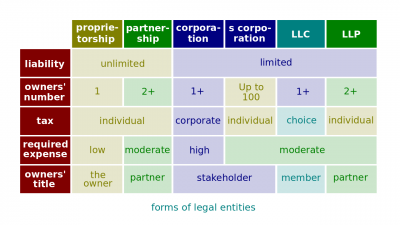Difference between revisions of "Legal entity"
(→Legal vs social entities) |
|||
| (One intermediate revision by the same user not shown) | |||
| Line 1: | Line 1: | ||
| − | [[File:Org-forms.png|400px|thumb|right|[[Legal entity]]]][[Legal entity]] (hereinafter, the ''Entity'') is any entity to which the law grants property rights and responsibilities. Particularly, the rights include capacity to buy and sell, enter into agreements or contracts, assume obligations, incur and pay debts, sue and be sued, as well as be held responsible for its actions. | + | [[File:Org-forms.png|400px|thumb|right|[[Legal entity]]]][[Legal entity]] (hereinafter, the ''Entity'') is any entity to which the law grants property rights and responsibilities. Particularly, the rights include [[capacity]] to buy and sell, enter into agreements or contracts, assume obligations, incur and pay debts, sue and be sued, as well as be held responsible for its actions. |
| Line 8: | Line 8: | ||
==Legal vs social entities== | ==Legal vs social entities== | ||
| − | The ''Entity'' differs from a [[social entity]], which | + | The ''Entity'' differs from a [[social entity]], which includes legally-dependent individuals such as underage children, but exclude those ''Entities'' that are not involved in [[social network]]s. |
==Related concepts== | ==Related concepts== | ||
Latest revision as of 00:42, 29 December 2020
Legal entity (hereinafter, the Entity) is any entity to which the law grants property rights and responsibilities. Particularly, the rights include capacity to buy and sell, enter into agreements or contracts, assume obligations, incur and pay debts, sue and be sued, as well as be held responsible for its actions.
Types
There are two types of the Entities:
- Legally-adult individuals or people who have attained the age of majority and is therefore regarded as independent, self-sufficient, and responsible. In the United States, the age of attaining legal adulthood is 18. However, local authorities may limit or change some definitions and rights. For instance, legal adults still cannot purchase alcoholic drinks until the age of 21;
- Organizations such as limited liability companies or corporations, which are given their legal status upon some government procedure, usually, by registration.
Legal vs social entities
The Entity differs from a social entity, which includes legally-dependent individuals such as underage children, but exclude those Entities that are not involved in social networks.
